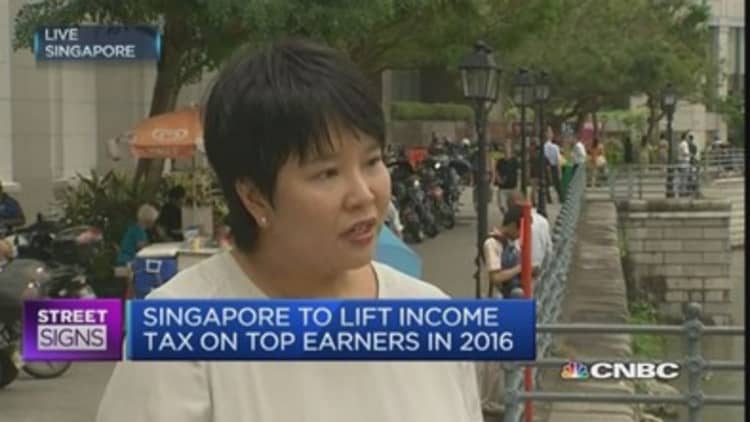Singapore's decision to hike taxes on its top earners has raised questions about whether the unanticipated move may erode the city state's longer-term competitiveness.
The nation's low tax regime has long been a magnet for attracting highly skilled talent as well as the super-rich from abroad.
In its budget for 2015 delivered on Monday, the government announced an increase in the income tax rate for those in the top tier – residents with a chargeable income exceeding 320,000 Singapore dollars ($256,000) – to 22 percent from 20 percent starting with income earned in 2016.
This is the first increase in the highest marginal personal tax rate in 30 years, according to Deloitte. The government will use the increased tax revenue to fund additional social and infrastructure spending over the longer-term.
"[Given] that Finance Minister Tharman opted for a more visible and direct hike in top tax rates sends a clear political signal of his redistributive intent, with greater progressivity in the income tax system via tax cuts for middle income earners and negative income taxes for lower income groups via Workfare," said Wei Zheng Kit economist at Citi. Workfare is a scheme by which the government supplements the income of low-wage workers.

While, Singapore still has one of the lowest personal income tax rates in Asia Pacific, the latest hike widens the gap with its archrival Hong Kong, which has a flat tax rate of 17 percent for income above 120,000 Hong Kong dollars ($15,500).
'Calculated risk'
Experts had varied opinions on what the government's redistributive efforts would mean for Singapore's competitiveness.
"This is a budget about strengthening the social safety net to help the silver generation and needy. It continues to attempt to create equal opportunities for Singaporeans," said Grahame Wright, partner of the human capital division at Ernst & Young Solutions. "The increase in top marginal personal tax rate is a calculated risk for Singapore, as its competitive position is weakened for a group of highly mobile senior executives."
Overseas talent – from high earning professionals to low wage laborers - remains an integral part of the Singapore's economy, accounting for around 25 percent, or 1.34 million of the country's 5.47 million population as of June 2014.
Read MoreSingapore raises spending, retirement benefits in budget plan
Alan Lau, tax partner at KPMG Singapore, meanwhile, is less concerned that higher taxes will deter top talent.
"The country continues to be a strong draw for its clean image, strong security, good livability and good governance," Lau said. "The increase in top-tier personal tax rate is unlikely to trigger any immediate adverse impact on Singapore's ability to attract top individuals to relocate, work and live in Singapore."
'Not against the idea'
Neil Clark, marketing director, Asia Pacific at eFinancialCareers – a financial services careers website – said he doesn't expect the tax increase will hurt recruitment efforts of Singapore firms.
"People at that level tend to take a lot of things into consideration when it comes to where they work. It's not just about money," he said. "In fact, a lot of our clients in Hong Kong have lost out on candidates because they take a role in Singapore because it offers a better quality of life, easier access to international schools, better air quality."
If the tax rate went up to 35 percent, that may be a different story, he said.
Reflecting Clark's sentiment, high earning foreigners that CNBC spoke with said the increase in taxes seems justified and would not drive them out of Singapore.
"The last decade hasn't been easy on the lower income brackets of Singapore society, so I'm not against the idea of a little wealth redistribution, it's not like they're proposing something like the French socialist government's tax on the rich," an expatriate lawyer who in the top income bracket told CNBC.
"You get tons of great services from the government - it's safe, clean, good public transport, good public hospitals and schools so at least the money is going somewhere useful," he said.


